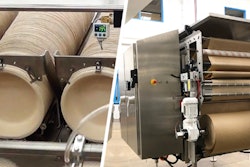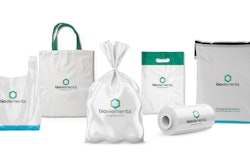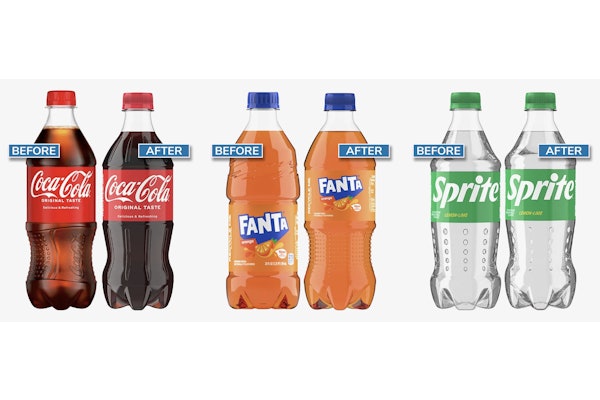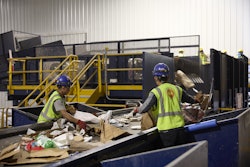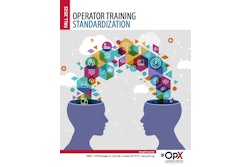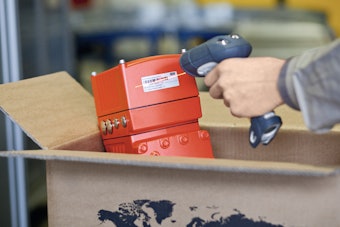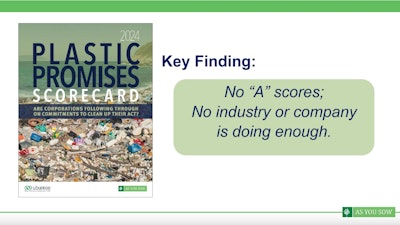
As You Sow, a non-profit investor organization focused on increasing environmental and social corporate responsibility, recently partnered with environmental solutions platform Ubuntoo to evaluate global companies on their corporate progress on plastic pollution. In a recent webinar, author, report partner, and As You Sow Circular Economy Manager Kelly McBee revealed their stark findings: “Every industry and every company can and should be doing more on plastics.”
McBee opened the webinar by emphasizing the urgency of the situation, sharing that “plastic pollution is set to nearly triple by 2040 without drastic action, and we are not on track to take action against this growing threat.”
 | Read this related article, “World Not Poised to Meet MacArthur Foundation Global Commitment 2025 Goal” |
In addition, she said, science is beginning to understand the link between the presence of microplastics, which result from plastics breaking down in the environment, and chemicals found in the human body. These alarming facts have spurred various stakeholders, including corporations, investors, and policymakers, to take a closer look at their roles and responsibilities.
“Companies have set some laudable targets for themselves to improve the sustainability of their packaging,” noted McBee. “As we approach 2025, which is the earliest deadline for many of the first set of these plastic packaging-related goals, companies do not appear to be on track to meet them.”
With this framework in mind, As You Sow and Ubuntoo produced a scorecard evaluating corporate commitments and action on plastics. A “first-of-its kind report,” according to McBee, the “2024 Plastic Promises Scorecard” evaluates 225 major companies across 15 industries with revenues of at least a billion dollars a year and provides a series of scores aimed at guiding corporate action and compare the corporate progress of peer companies.
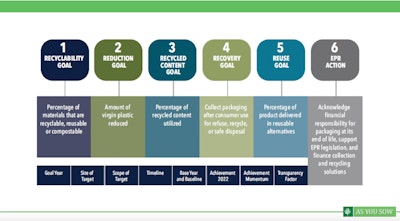 The report’s methodology involved a detailed scoring system based on six pillars.
The report’s methodology involved a detailed scoring system based on six pillars.
The report’s methodology involved a detailed scoring system based on six pillars: recyclability, reduction, recycled content, recovery, reuse, and public-facing support for extended producer responsibility (EPR). Companies were evaluated on both their ambition (30%) and action (70%), with a heavier weight given to actual progress, emphasizing the importance of companies following through on their commitments. Despite many companies setting ambitious goals, the report found that most are not on track to meet them by 2025.
None of the companies evaluated received a score in the A range (A+, A, or A-), and only nine of the 225 companies scored in the B range. Of the 4% receiving a score of B+, B, or B-, four were CPG brands: The Coca-Cola Company, Keurig Dr Pepper, SC Johnson, and Unilever.
Report provides recommendations
Delving into the granular findings of the report was Ubuntoo Co-Founder Venky Kini, who shared that the most common goal among companies was recyclability, with many aiming for 100% recyclable plastic packaging. However, he pointed out, “only 22 companies are on track to meet their goals.”
One challenge Kini noted was the gap between theoretical recyclability and practical, at-scale recyclability. “Companies need to define recyclability in a way that allows consumers to have access to recycling facilities,” he noted. This distinction is crucial for meaningful progress, as many companies claim high recyclability rates that do not translate into real-world outcomes.
The report also examined recycled-content goals, with 145 out of 225 companies setting explicit targets. However, the availability of recycled material remains a significant hurdle. Kini recommended prioritizing post-consumer over post-industrial content and pointed to beverage container deposit schemes as effective in improving recycled content availability.
One of the most ambitious goals companies were rated on was the recovery of plastic packaging waste post-consumer. Said Kini, “Only nine companies out of the 225 have declared explicit goals to recover their packaging from the environment,” with some committing to 100% recovery. This goal, while challenging, represents a crucial step towards reducing plastic pollution.
McBee shared results on corporation’s use of reusable packaging, including package-free and refillable formats. “This pillar is important because it fundamentally disrupts the traditional linear model of delivering goods to consumers,” she explained.
While the report shows that 43 companies are piloting reusable initiatives, few have set quantitative, time-bound goals to integrate these pilots into their operations permanently. “One of our recommendations is that companies take the learnings from these reusable pilots and set new goals, make new commitments for how these can be permanent practices,” McBee said. “Additionally, as reuse is one of the more novel components in plastic packaging, companies need to determine uniform data tracking and greater transparency on reusables reporting. Investors and other stakeholders need to be able to determine what companies are doing and what their learnings are, and that can only be done if companies are reporting in a uniform fashion.”
McBee also addressed EPR, which she referred to as “the financial component of the circular economy,” whereby companies are held accountable for the end-of-life management of their packaging. The report found that 73 companies are proactively engaging in EPR, going beyond compliance to support recycling infrastructure and legislative efforts. McBee encouraged companies not yet involved to adopt public-facing support positions on EPR policies, potentially influencing the passage of more comprehensive regulations.
Global Commitment signatories in the lead
The highest scores came from signatories of the Ellen MacArthur Foundation’s Global Commitment, which is the largest global voluntary effort to tackle waste and plastic pollution.
Said webinar guest Aisha Stenning, global commitment program manager for the Ellen MacArthur Foundation, “Committing led to signatories being better informed and taking more targeted action. The transparency it [the commitment] created was unprecedented. Also, the accountability from publicly committing to these targets was very different. Investors and other organizations, and also people within those organizations, were now holding each other accountable.
 | Read this related column from TerraCycle/Loop CEO Tom Szaky, “What’s Needed to Scale Reuse?” |
“It also led to a collective effort, because the fact that these signatories shared the same targets with their peers, suppliers, and customers made their actions more than the sum of their individual commitments. It also created communities driving actions.”
As the higher scores of the Global Signatories demonstrates, the role of cross-sector collaboration cannot be overstated as industry continues to grapple with the plastic pollution crisis. Governments, corporations, non-profits, and consumers must work together to create a sustainable future. The As You Sow report serves as a crucial reminder that while progress has been made, there is still a long way to go. The collective efforts of all stakeholders will be essential in driving the systemic changes needed to address this pressing issue. PW



